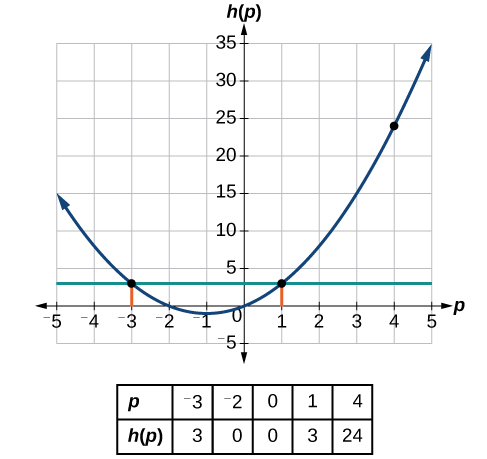| << Chapter < Page | Chapter >> Page > |
Given the function evaluate
To evaluate we substitute the value 4 for the input variable in the given function.
Therefore, for an input of 4, we have an output of 24.
Given the function evaluate
Given the function solve for
If either or (or both of them equal 0). We will set each factor equal to 0 and solve for in each case.
This gives us two solutions. The output when the input is either or We can also verify by graphing as in [link] . The graph verifies that and

Given the function solve
Some functions are defined by mathematical rules or procedures expressed in equation form. If it is possible to express the function output with a formula involving the input quantity, then we can define a function in algebraic form. For example, the equation expresses a functional relationship between and We can rewrite it to decide if is a function of
Given a function in equation form, write its algebraic formula.
Express the relationship as a function if possible.
To express the relationship in this form, we need to be able to write the relationship where is a function of which means writing it as
Therefore, as a function of is written as
Does the equation represent a function with as input and as output? If so, express the relationship as a function
First we subtract from both sides.
We now try to solve for in this equation.
We get two outputs corresponding to the same input, so this relationship cannot be represented as a single function
If express as a function of
Are there relationships expressed by an equation that do represent a function but which still cannot be represented by an algebraic formula?
Yes, this can happen. For example, given the equation if we want to express as a function of there is no simple algebraic formula involving only that equals However, each does determine a unique value for and there are mathematical procedures by which can be found to any desired accuracy. In this case, we say that the equation gives an implicit (implied) rule for as a function of even though the formula cannot be written explicitly.

Notification Switch
Would you like to follow the 'Essential precalculus, part 1' conversation and receive update notifications?